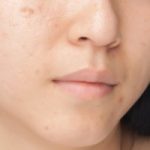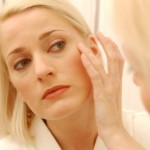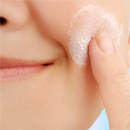 Rosacea is an inflammatory skin condition that often affects the middle-aged and elderly. Rosacea is a chronic condition – meaning it stays with the person for a long time – that mainly affects the skin, although it can also affect the eyes. Rosacea causes redness and pimples and is most common in women, middle-aged and elderly people.
Rosacea is an inflammatory skin condition that often affects the middle-aged and elderly. Rosacea is a chronic condition – meaning it stays with the person for a long time – that mainly affects the skin, although it can also affect the eyes. Rosacea causes redness and pimples and is most common in women, middle-aged and elderly people.
When rosacea first begins it may appear as a small rash or an outbreak of pimples, but over time the condition can worsen and cover larger areas of the face. Inflammation is responsible for causing the skin to swell, become sensitive and have a reddish appearance. If the eyelids become inflamed, it can lead to vision problems.
Advertisement
Roughly 14 million Americans suffer from rosacea, and the condition tends to run in families. Although a cause is unclear and anyone can develop it, those with lighter skin tend to experience rosacea more so than other ethnicities.
Signs and symptoms of rosacea
Rosacea sufferers not only have to deal with the physical symptoms, but they experience symptoms that are not seen but felt as well. Signs and symptoms of rosacea include:
- Flushing and redness of the face
- Visible broken blood vessels
- Swollen skin
- Sensitive skin
- Stinging or burning skin
- Dry, rough or scaly skin
- Acne-like breakouts
- Oily skin
- Bumpy skin texture
- Skin begins to thicken
- Enlarged pores
- Watery or bloodshot appearance of eyes
- Gritty feeling in eyes
- Dry eyes
- Itchy eyes
- Blurry vision
- Broken blood vessels on eyelid
- Cyst on eyelid
Emotional and mental symptoms can be experienced in rosacea sufferers as well, including:
- Anxiety
- Low self-esteem
- Worry
- Work-related problems
- Anxiety and depression
- Frustration and embarrassment
Causes and risk factors of rosacea
People between the ages of 30 and 50 are susceptible to developing rosacea. Other risk factors for rosacea include being light-skinned, family history, ethnic background of Celtic or Scandinavian decent, and individuals who are likely to experience acne.
Although the exact cause of rosacea is not fully understood, here are possible causes that can contribute to the development of rosacea.
- Family history
- A reaction in the immune system, which causes it to overreact
- A bug or parasite like H. pylori
- A mite that lives on the skin
- A protein that is supposed to protect the skin but instead causes redness and swelling
Diet and triggers for rosacea
There is an abundance of rosacea triggers, from lifestyle to environmental to even foods in our diet. Here is a list of triggers for rosacea.
Temperature-related
- Saunas
- Hot baths
- Overheating
- Excessively warm environments
Weather
- Sunny
- Windy
- Cold
- Humid
Drugs/medical conditions
- Vasodilators
- Topical steroids
- Frequent flushing
- Menopause
- Chronic cough
- Caffeine withdrawal syndrome
Emotional influences
- Stress
- Anxiety
Skincare products
- Products that contain alcohol, witch hazel or fragrances
- Hydroalcoholic or acetone substances
- Substances that cause redness or swelling
Food/beverages
- Liver
- Yogurt
- Sour cream
- Cheese
- Chocolate
- Vanilla
- Soy sauce
- Yeast
- Vinegar
- Eggplant
- Avocados
- Spinach
- Broad-leaf beans
- Citrus fruits
- Spicy or thermally hot foods
- Foods high in histamines
- Alcohol
- Hot beverages
Treatment and tips for managing rosacea
The different signs and symptoms of rosacea require different treatments, which is something a dermatologist must keep in mind when recommending treatment for rosacea. Skin-specific treatment includes:
- Topical medicine
- Wearing sunscreen
- Emollient to repair skin damage
- Lasers and light therapies
- Antibiotics – topical and pill form
Thickening of the skin can also be treated with lasers and dermabrasion, which removes layers of the skin.
Advertisement
Rosacea is often a lifelong condition, but with the guidance of a dermatologist you can have it under control. Even though there may be periods where rosacea does not flare-up, you still have to be mindful of triggers and stick with your designated treatment plan.
Tips for managing rosacea
Aside from medical intervention, lifestyle habits, such as modifying your diet and avoiding triggers, can also help better manage rosacea. For starters, here are foods that can help manage rosacea.
- Chicken
- Cold-water fish
- Fresh vegetables
- Fresh fruit
- Nuts
- Seeds
- Tofu
- Whole grains
- Flaxseed oil
Lifestyle habits to better help manage rosacea include:
- Wearing sunscreen
- Protecting your face from hard winds and the cold
- Avoid rubbing or touching your face
- Apply a gentle cleanser to affected areas
- Don’t use facial products that contain irritants
- Use a moisturizer for sore skin – once again without irritants
- Avoid getting too hot
- Use an electric razor when shaving – it is less likely to cause flare-ups
- Green or yellow pre-foundations may reduce redness
- Avoid over-the-counter steroid creams
- Minimize and reduce stress
With the help of a dermatologist, along with making simply lifestyle habit changes, you can reduce flare-ups of rosacea. If anxiety and low self-esteem are a problem, you may want to seek out a support group or therapy to overcome the emotional side of rosacea.
